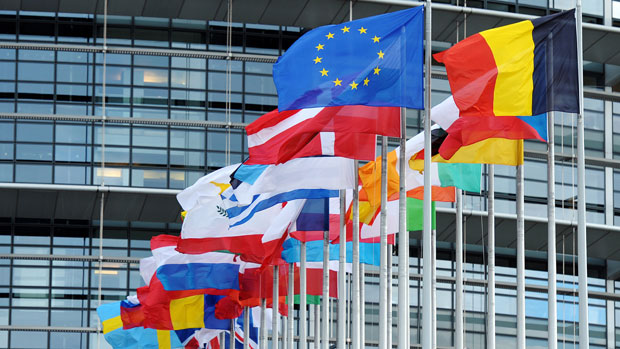Tackle the eurozone's original sin or watch the EU stagnate
On the eve of the EU elections, economist Guido Cozzi lays out the rules for saving the eurozone

A free daily email with the biggest news stories of the day – and the best features from TheWeek.com
You are now subscribed
Your newsletter sign-up was successful
What do the latest growth figures teach us about Europe? First, the overall growth performance of the European Union is worse and more fragmented than expected. GDP in vulnerable countries such as Greece and Italy has declined, shrinking by 1.1 per cent and 0.5 per cent respectively since the first quarter of 2013. With growth essential for stability in the politically and socially torn EU, these figures are particularly worrying.
It is also apparent that the eurozone is performing worse than the rest of the EU. The EU’s GDP has grown by 1.4 per cent over the past year, while those countries in the euro have grown at just 0.9 per cent. Even the much-envied eurozone champion Germany is lagging behind the UK’s current growth rate.
This pattern is not confined to the current growth figures. The EU inflation rate last year was greater than the eurozone’s. Similarly, the EU’s unemployment rate was lower than the eurozone’s; and EU’s public debt/GDP is 89.5 per cent, with the eurozone’s at 96.0per cent.
The Week
Escape your echo chamber. Get the facts behind the news, plus analysis from multiple perspectives.

Sign up for The Week's Free Newsletters
From our morning news briefing to a weekly Good News Newsletter, get the best of The Week delivered directly to your inbox.
From our morning news briefing to a weekly Good News Newsletter, get the best of The Week delivered directly to your inbox.
The inequalities among eurozone member states clearly aggravate this scenario: the highest eurozone unemployment rates (Greece and Spain are both more than 25 per cent) were significantly higher than the highest unemployment rates of the non-euro EU states (Croatia’s 18.0 per cent and Lithuania’s 12.8 per cent). The highest eurozone government debts (Greece’s 177.2 per cent and Italy’s 135.2 per cent) overshadow the highest non-euro members (UK’s 91.8 per cent and Hungary’s 80.3 per cent), to name two of the most shocking disparities.
Yet the euro is the pride of the whole European project; it is meant to discipline public finances, facilitate credit, transactions and foreign trade. Sadly, it is displaying a weak performance just ahead of historically important elections of the European Parliament, which will for the first time determine the democratisation of the European Commission.
What’s going on?
This weakness is despite the supposed advantage of having a single currency which is highly valued in international transactions and in central banks’ reserves, and which keeps gaining value against the US dollar and other important currencies.
A free daily email with the biggest news stories of the day – and the best features from TheWeek.com
Unfortunately, the relative strength of the euro is actually a trigger for the eurozone’s problems. It depresses the export demand for goods produced in its vulnerable countries – Greece, Cyprus, Portugal, Italy, Spain and even France. Who wants to pay expensive euros for something made in Italy when cheaper alternatives are available? This exacerbates the gaps between these nations and the most robustly competitive countries such as Germany.
Cheap imports channel domestic demand abroad – Italians themselves think the same, why buy expensive stuff made here when we could buy cheaply from overseas? This in turn instigates deflationary pressures, via lower import prices. While deflation is yet to happen, the abnormally low inflation rate renders the real interest rate on loans and on government bonds increasingly high, which contributes to fuelling recession as companies and governments are too indebted.
Growing pains
As a growth economist, can I even talk about the conventional economic growth theory I am used to thinking about? Growth is a longer-term outcome of research and development, innovation, education, entrepreneurship, high-tech infrastructure and so on. But this situation is different: we have millions of unemployed people willing and able to be productive, with their families willing to consume. However the existing European market institutions are simply unable to put them to work, while the existing physical capital depreciates under-utilised. There must be something wrong here.
I suspect we all know what it is: an abnormally high level of accumulated sovereign debt inherited from the past. This is the “original sin” that has characterised the rise of the eurozone: countries were admitted to a self-proclaimed virtuous club, despite most of them already violating the 60 per cent debt/GDP ratio formally required for admission. Extravagant spenders, if not serial defaulters, were admitted into the club.
Unlike other original sinners – typically defined as developing countries issuing foreign debt in stronger currencies -– the “eurozone sinners” are banned from printing money even to repay some of their internal public debt. The old story was that this would impose discipline on them, which is quite ironic in light of the ensuing events.
But those were optimistic times, with some readers just mumbling at number inconsistencies. Unfortunately, times turned tough, with the great recession of 2008-2009 – and the mumblers turned into resentful eurosceptics ready to destroy the whole thing.
Free international labour mobility, for instance, is a major part of a successful currency union. But this is a hard message to swallow for a labour force threatened by mass unemployment, declining real wages, and fragile social security. Witness the rise of Ukip, the Dutch Party for Freedom (PVV) and many other nationalist parties across Europe.
Paying the bill
It is now time to start to pay the bill for the original sin. Eurozone countries could do this by taking advantage of the continued global demand for euros, the near-zero inflation and interest rates, and the large reserves of under-utilised productive resources in the EU. Like a sort-of European Marshall plan to save economic and social cohesion, the European Central Bank could decide to buy more of the existing stock of government bonds, starting with the most risky, like those of Greece and Italy.
Buying up some sovereign debt would not create inflation if properly carried out, but it would help Europe’s economies end their stagnation, absorbing many of the unemployed and stimulating genuine investment. It might even open the door to serious long-term economic growth.
Would such badly needed intervention encourage future government misconducts? An economist cannot make promises about politicians' morality; responsibility for this ultimately resides with younger European voters.
Guido Cozzi is Professor of Macroeconomics at the University of St Gallen, Switzerland. This article was originally published by The Conversation.
-
 How the FCC’s ‘equal time’ rule works
How the FCC’s ‘equal time’ rule worksIn the Spotlight The law is at the heart of the Colbert-CBS conflict
-
 What is the endgame in the DHS shutdown?
What is the endgame in the DHS shutdown?Today’s Big Question Democrats want to rein in ICE’s immigration crackdown
-
 ‘Poor time management isn’t just an inconvenience’
‘Poor time management isn’t just an inconvenience’Instant Opinion Opinion, comment and editorials of the day
-
 How corrupt is the UK?
How corrupt is the UK?The Explainer Decline in standards ‘risks becoming a defining feature of our political culture’ as Britain falls to lowest ever score on global index
-
 The high street: Britain’s next political battleground?
The high street: Britain’s next political battleground?In the Spotlight Mass closure of shops and influx of organised crime are fuelling voter anger, and offer an opening for Reform UK
-
 EU-Mercosur mega trade deal: 25 years in the making
EU-Mercosur mega trade deal: 25 years in the makingThe Explainer Despite opposition from France and Ireland among others, the ‘significant’ agreement with the South American bloc is set to finally go ahead
-
 Who is paying for Europe’s €90bn Ukraine loan?
Who is paying for Europe’s €90bn Ukraine loan?Today’s Big Question Kyiv secures crucial funding but the EU ‘blinked’ at the chance to strike a bold blow against Russia
-
 Moscow cheers Trump’s new ‘America First’ strategy
Moscow cheers Trump’s new ‘America First’ strategyspeed read The president’s national security strategy seeks ‘strategic stability’ with Russia
-
 ‘They’re nervous about playing the game’
‘They’re nervous about playing the game’Instant Opinion Opinion, comment and editorials of the day
-
 Is a Reform-Tory pact becoming more likely?
Is a Reform-Tory pact becoming more likely?Today’s Big Question Nigel Farage’s party is ahead in the polls but still falls well short of a Commons majority, while Conservatives are still losing MPs to Reform
-
 Tariffs: Will Trump’s reversal lower prices?
Tariffs: Will Trump’s reversal lower prices?Feature Retailers may not pass on the savings from tariff reductions to consumers